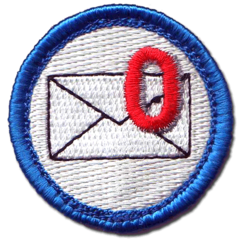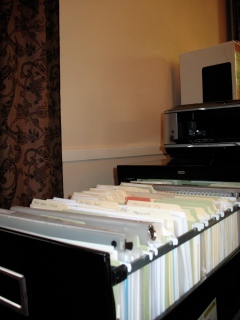Archive for the ‘Organizing’ Category
Update: In-box zero
Back in June I pledged to achieve in-box zero by the first day of autumn, so I owe you, dear readers, an update.
How did I do? In a word: busted.
I managed to keep up with most everything that came in during the past three months, but the backlog is a mere 10 percent smaller than it was. My 500+ message in-box has been whittled to just under 450.
Two points need to be made as I consider my failure to live up to my plan. First (and I think it was Merlin Mann who first said this), before you get good, you have to stop sucking. I did succeed in not sucking. I kept up with incoming mail. That alone is a habit worth latching onto and nurturing for all its worth.
Second, to be fair I had some dire family issues that intervened. Entrepreneurs need to be good bosses to themselves, remembering that we must sometimes cut ourselves some slack. I had some understandable reasons for missing my goal.
So, what have I learned so far?
- In-box zero is an illusive goal. It’s really hard to get there and stay there.
- Even in tough times, I did better than stay even. I made progress. Good for me.
- I really want to reach this goal. I will keep working at it.
The modern work world throws more stuff at us than we can comfortably handle. Those of us who experiment with new ideas in organization and distill others’ productivity prescriptions down for your easy digestion, we’ll continue to seek new ways for all of us to keep up with what really matters and let go of what isn’t important.
Have you tried to achieve an empty email in-box? Tell me about it. And if you’ve found a brilliant way to make it happen, definitely tell me about it. There are thousands of us who are dying to know!
No Regrets
When I asked my father, then aged 85 and about to move out of the home he’d built with his own hands 25 years earlier, whether there was anything more he really wanted to do, his response was memorable: “You can always think of more things to do in a day than you can get done. But, no, there’s no place I want to go and nothing I want to do that I haven’t already done.”
What an inspiration, a life so well-lived as to be free of regrets!
My father is the source of my “organizing genes”. His well-appointed workshop was legendary for being immaculate: no sawdust, no unlabeled bins, no tools without a home. When I was 12, we worked together on a large project: he painted some 50 empty coffee cans an appealing pale yellow and I hand-painted labels on them in black: “3/8 inch bolts”, “roofing nails”, “1/2 inch washers”. The ones that made everyone smile were the set of three labeled “miscellaneous”, “maybe here”, “it’s here”.
From his workshop my father turned out a succession of projects requested by his family — a desk for my mother, adjustable stilts and a toy sailboat and a slingshot for my son, a cuckoo clock for one granddaughter, a chicken coop for me, a playhouse for my brother’s girls, a coffee table for my sister, and much more — along with many projects inspired by his own varied interests. (The snowy plover in the photo was made for me at my request; if I had asked for a six-foot California condor instead, I probably would have gotten it.)
One year I phoned my parents at about 9 pm on December 31st to wish them a happy new year. My mother and I chatted for a while, then she said, “Well, I’d call your father to the phone, but he’s got a project that he wanted to finish this year, and he’s downstairs working on it.”
For a man in his 70’s and 80’s, January 1 was much like December 31, yet he valued his time, he established goals, and he did what was necessary to achieve those goals. He couldn’t come to the phone on December 31st; he had a deadline to meet!
His joyful dedication to his chosen work resulted in a long life well lived, with no regrets.
Last week I read an article about the regrets of the dying by Bronnie Ware, that I found quite striking. The author, who worked for many years in palliative care, assembled the top five regrets that she had heard repeatedly from those at the end of life. Listening carefully to those with very little time left can often help us clarify what matters most to those of us who, for now at least, have time to spare.
The one I found most surprising was the fifth on the author’s list of five, “I wish that I had let myself be happier.” Wise men from Marcus Aurelius to Abraham Lincoln have observed that happiness is a choice, requiring very little to be within our grasp. Yet it seems that many of us have a hard time realizing that happiness is ours for the choosing.
My father had made that choice, and kept it throughout his long life, which ended this past Saturday, at the age of 92. Among the many things that I appreciate about him, one that I value more highly than the many objects he gave me is the fine example he showed me of a life with no regrets.
One Easy Way to Get That Shredding Done
Feeding old financial documents and client files through a small office shredder is no one’s idea of fun. Finding a shredding company that will pick up less than 10 boxes of paper can be tough. So how does the small office or home office clear out a backlog of shredding?
Many local stores such as the UPS Store and various pack-and-ship places take shredding by the pound. I recently dropped off about 10 pounds (one fully loaded grocery bag) of confidential paper at a UPS store, where for $1.50 a pound they dump it into a locked container, which will be picked up by a NAID-certified shredding company.
The store didn’t advertise this service, and I scoured the UPS main website in vain, looking for the ability to search for this service throughout the US. Why they don’t advertise it more widely is a mystery to me. Many home and small offices are run by people with badly bruised knuckles, thanks to attempts to stuff just one more sheet into a file drawer that needs a good cleaning out.
How do you get your shredding done? When did you last do it? Any questions about what to shred? Leave a comment here.
Worth repeating – August posts from New Leaf News
 I’m sharing a few posts from the New Leaf archives. Here’s what was on our mind in August during the past couple of years.
I’m sharing a few posts from the New Leaf archives. Here’s what was on our mind in August during the past couple of years.
Productivity depends on being able to work in comfort. Eliminate at least one pain in the neck with a wireless headset.
Successfully planning for the future requires acknowledging past wins. Are you overlooking this step in your business plan?
The longer I use Evernote, the more I like this free tool for storing, sorting, and retrieving information. Is your desk littered with a bunch of little notes that you don’t know how to keep? Evernote might be the answer to keeping the information but ditching the paper.
Avant-garde artist and filmmaker Andy Warhol understood the art of business and the business of art. Here he speaks about both endeavors.
Happy August to all the New Leaf News readers & writers!
In-Box Zero

photo courtesy of http://www.nerdmeritbadges.com
Remember merit badges, those embroidered circles used to mark achievement for Boy Scouts and Girls Scouts? Now there is a company that makes merits badges for grown-ups, and there’s one I desperately want to earn: In-Box Zero.
My goal of an empty email in-box is more elusive than live tech support. I crossed into the new year on 1/1/10 with an empty in-box and a zero credit card balance. The credit cards are still paid off, but the in-box currently houses over 500 messages.
I know what’s there. It’s not that I haven’t taken in the content of those 500 messages; I have. Some are offers I wanted to think about, like a class I wanted to attend but wasn’t sure I’d have time for. (I didn’t.) Some are newsletters I haven’t read (and probably never will.) Some are threads of complicated conversations involving several people, conversations in which I am not an active participant but was copied on the messages because someone thought I might be able to contribute or might need to know.
I receive between 80 and 100 emails each day, which based on my non-scientific observations of business people, is about average. I deal promptly with the vast majority. I respond and delete, or I file for later action, or I file for reference. Still, that 3 or 4 percent that I don’t move out of the inbox immediately begins to accumulate, until by mid-year I’m looking at a 500-message surplus. A quick calculation indicated that if I could deal with just three more messages each day, I could have kept the message count to nil. But three more was too many.
The goal of in-box zero is a great goal, but I know that I’m not the only one who struggles with it. How do I know? Two ways: I’ve worked with clients who’ve had tens of thousands of inbox messages they needed to clean out. And whenever someone reaches inbox zero, they’re apt to crow about it. Just this week author and business guru Tim Sanders posted a screen shot of his empty inbox. That’s a measure of how difficult it is to achieve.
Still, I remember how great it felt to have my computer desktop as well-ordered as my physical desktop. I’d like to get back to that happy state. And the causes of my email clutter are the very same things that cause my clients’ physical clutter: deferred decisions, being unclear about what the next action should be, and keeping things I don’t need.
So here’s my mid-year resolution: I’m going to return to inbox zero by the first day of autumn. That means dealing with an extra 5 or 6 messages a day for the next 3 months.
- I will unsubscribe from newsletters I don’t read; I’ve already canceled three.
- I’ll make time each week to review those tempting offers and make a firm decision about whether or not I’ll accept them, then either delete the email or sign up and delete.
- I’ll make time to review any long conversations in which I’m just copied, and either participate or bow out.
And I’ll do the work required to keep the email from accumulating again. Check back to see my progress toward my goal. And if you’d like to join in with a goal of earning your own In-Box Zero badge, state your intention by leaving a comment here.
Want to get organized for business? This class can help.
 Tired of an overflowing in-box? Would you like to be better organized? Want to manage your time, paper, and energy, and have a lot more fun doing it? There’s a class that focuses on the skills and tools you need to banish disorganization in your office.
Tired of an overflowing in-box? Would you like to be better organized? Want to manage your time, paper, and energy, and have a lot more fun doing it? There’s a class that focuses on the skills and tools you need to banish disorganization in your office.
I’ll be teaching “Organize Your Business Life” at College of San Mateo on Saturday, May 15.
Learn to handle incoming items effectively, set priorities, follow through, get the most from your time, positively affect your stress level and the stress level of those around you — and more.
This class makes use of presentations, participant exercises, and class participation to help you learn new and useful skills. I’d love to share the skills, the information, and the fun with you! (And community college classes are a great bargain – don’t miss out!)
If you’re not in the San Francisco Bay Area, please contact me directly by leaving a comment here. I’ll be happy to point you toward resources available to you in your area.
What are your biggest office organizing challenges? Time? Paper? Setting priorities? E-mail? Let me know!
Listen to “Getting Organized with Margaret Lukens” podcasts
 Would you like to listen to your organizing and productivity information as well as read it?
Would you like to listen to your organizing and productivity information as well as read it?
The latest episodes of my radio program, “Getting Organized with Margaret Lukens”, are now available as podcasts on iTunes.
The free podcasts were originally broadcast on WHDD public radio in Connecticut, New York, and Massachusetts. Now you can download them and listen any time.
Check back often — even more programs are in the works.
Are professional organizers perfectly organized?
This recent news from my organizing colleague Margaret Pearson Pinkham, who specializes in working with chronically disorganized clients in Sonoma County, CA:
I went to sign up for the Spring season of NSGCD teleclasses and guess what? I had waited too long and the class on Procrastination was FULL!
Occasionally someone will ask me whether I, a certified professional organizer, am perfectly organized. Does a doctor get the flu? Has a horse trainer ever been bitten? Can good mechanics suffer an automotive breakdown?
 Here’s the truth: we all are sometimes overwhelmed with all the stuff that comes at us. I know what it means to be late, to feel disorganized, to procrastinate, and to lose things — all from personal experience.
Here’s the truth: we all are sometimes overwhelmed with all the stuff that comes at us. I know what it means to be late, to feel disorganized, to procrastinate, and to lose things — all from personal experience.
In fact, I would beware of any professional who has not faced and conquered their own hurdles. Who is more likely to help me, the personal trainer who has healed from their own tweaky knee or bad back, or the one who has found fitness a breeze from day one?
I am always on the lookout for new and better ways to address the challenges of modern life. First, I form the habits that make organization possible, including making a clear and compelling plan, recognizing what I need to capture and how to let go of the rest, and the discipline of actually doing the work. Then I look for whatever tools can make it easier for me to do the job.
And because there is no one solution that works best for everyone, I also look for whatever tools may help YOU do the job, too.
What organizing, time management, and productivity issues give you a hard time? What hurdles would you most like to get over?
Productivity in 10 words or less
Really. You can sum up all the productivity advice in the world in just 10 words:
All the rest is commentary.
(I made the photo using the Candy Heart Generator at www.iheart.despair.com, a site I also enjoy for their very funny, satirical anti-motivational posters. Pay them a visit.)
Five steps for ending “tolerations”
I call them “tolerations” – those little irritants we hardly notice. Maybe it’s something small, like a sticking wheel on a desk chair. Maybe it’s something you try to ignore because you feel you can’t change it, like a noisy neighbor. It could be your life-long habit, such as piling your papers rather than filing them, making your desk feel like a barricade.
Whatever our tolerations are, they act like potholes in our path. They slow us down and make the journey much less pleasant than it needs to be.
Uncovering and addressing our tolerations can free up huge amounts of time and energy.
Here’s an exercise that I use to uncover and eliminate those energy-sapping tolerations:
- Make a list of anything that you may be tolerating, putting up with, overlooking – anything that bothers you or drags you down at work. These could be incomplete tasks, other people’s behavior, equipment and tools, frustrations, problems, or even your own behavior.
- Choose one to work on. (This is where a coach can be especially beneficial, helping you determine whether this is the time for small steps or bigger challenges, and what is the best focus for you right now.)
- Consider this toleration. How long have you had it? What do you know of its origin? How big is its impact now? What would be your payoff if you were to eliminate this toleration?
- What do you want to do with this toleration? You may know immediately how to get rid of it. If not, brainstorm several steps you could take to address your chosen toleration.
- Take action now.
Take a deep breath and enjoy the increased room in your office, your schedule, or your mind!
What have you been tolerating? Are you ready to get rid of it now? Leave a comment here.
 Comments (3)
Comments (3)




